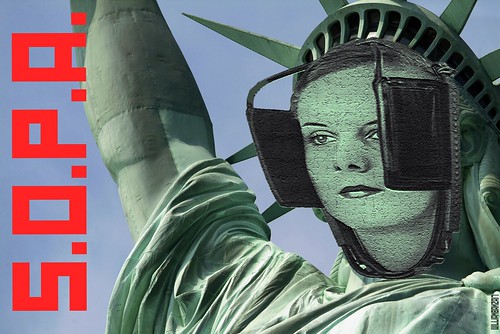Courtesy of Joshua M. Brown, The Reformed Broker
Why do the Big Six media companies want SOPA to be so punitive toward web companies like Google who are clearly not in favor of copyright violation themselves? What if I told you that it has as much to do with "protecting the pipe" as it does protecting the content itself?
It turns out that almost all of the content owners have more to lose when their cable company ownership is rendered useless by new, cheaper streaming alternatives – in other words the anti-piracy campaign might really be about stunting the growth of even legitimate online distribution.
So says Edward Jay Epstein, legendary investigative journalist and author of The Money Demons

Now we learn why Christopher Dodd, the retired Senator from Connecticut, is receiving over $1.5 million a year to head the Motion Picture Association of America.
The MPAA, the trade organization for the Hollywood studios, is financed by Warner Bros., Fox, Universal, Disney, Sony, and Paramount. Each provides about $10 million per year. Aside from efforts to suppress digital piracy, it lobbies Congress and regulatory agencies. Its crucial job here is to protect the Big Six’s crown jewels: their intellectual properties. Without their libraries of movies, animated shorts, and TV series, they couldn’t survive.
Consider Warner Bros. Its library has more than 60,000 licensable properties, including 6,500 movies and 40,000 TV episodes. Whereas its DVD sales have been on the wane, its TV licensing has skyrocketed. In 2010, according to sources at Time Warner, Warner Bros. harvested over $4 billion from worldwide licensing to TV. Nearly 80 percent came from just four cable customers—HBO, Turner, ABC Family, and NBC-Universal’s cable channels. Not only did this far exceed its share of theatrical box-office receipts, which were $2.4 billion in 2010, but this licensing is highly profitable: The studio pays none of the cost of advertising, prints, or logistics. Almost all proceeds, minus some residuals paid to third parties, go to a studio’s bottom line. Whatever the vagaries of the box office, licensing is the largest and most reliable source of profits for the studios.
But these golden geese are in danger of being strangled to death by video streaming. New age companies, notably Netflix, Amazon, Apple, and Google, now compete with cable TV by streaming movies and other video directly over the Internet. Netflix, for instance, offers unlimited streaming for $1 extra a month with its mail-in service, Amazon offers free streaming to its 10 million Amazon Prime customers, and Google offers YouTube free.
Keep reading at Jay's site below:
Hollywood's Pirates of the Internet (The Hollywood Economist)
Pic credit: William Banzai at Flickr




